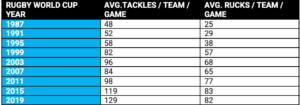Alix Popham on dementia diagnosis and how rugby can be made safer
There is a largely unopposed belief in the scientific community that chronic traumatic encephalopathy (CTE) is caused by a cumulative toll of repeated blows to the head, including the innumerable number of sub-concussive impacts we see in rugby.
In 2014, Dementia UK reported that there were 1,339 people living in the UK with dementia between the ages of 30 and 44, which equates to roughly one in every 9,500.
Towards the end of 2020, we heard that several former professional rugby players belonging to that demographic had been diagnosed with the condition, with eight joining a legal action against World Rugby, the RFU and the WRU.
Thus, the dangerous reality is that professionals aren’t being protected as much as they should be. That can change – quite easily, too.
Ex-Welsh international, Alix Popham, was diagnosed with probable CTE and early onset dementia in April of last year and is one of the players involved in the legal battle. Although the ongoing case prevented Popham from giving details on any legal concerns, he spoke honestly to the Sports Gazette about his diagnosis.
“We call it D-Day,” he said. “It was the 16th of April, but it was most probably 9-12 months building up to that day where I knew there was something wrong and not right.
“My wife knew more; it was more obvious to her day in day out with things that were happening. So, in a funny way, it was a relief as it gave us answers for certain symptoms that I was having, things I was struggling with.”
Despite being relieved to learn about what was really going on, he soon realised that he couldn’t have been the only former player to have been diagnosed, and so, he reached out to others.
“I thought to myself, I can’t be the only player like this,” he added. “I started reaching out to players who I played with [and] played against.
“After I’d spoken to most probably 50-75 players, over 50% of them were struggling in some way, shape or form.”
Whilst authorities have been proactive in some areas since Popham retired – for example, by adopting concussion assessment protocols into law – he believes those in charge can still do so much more.
When you consider how physical the modern game has become, it’s fair to say that he has a point.
The graphic below shows how the number of tackles made and the number of rucks formed (both per game) have drastically increased since the first ever Rugby World Cup in 1987.

Where data was sourced: statsperform.com.
Essentially, whether rugby’s leaders like it or not, no amount of smooth-talking or declarations about the need for better research can deny the fact that the game has become more physical, and consequently, slightly more dangerous as a result, especially since it became a professional sport in 1995.
Clubs are smarter with their approach to preparation nowadays. However, because contemporary matchdays are more intense – as the evidence suggests – and because players are overwhelmed by a newfound pressure to win, the current generation of players are naturally in danger of suffering from similar symptoms.
Popham, other diagnosed players, and Head for Change – a foundation pioneering positive change for brain injuries – have presented several plausible solutions that could help to protect the current professional generation.
“We’ve come up with six proposed changes to the game that will make it safer and 90% of those are stuff that happens during the week that you can control,” he said.
The biggest change involves cutting back contact hours in training, like what’s been done in the NFL.
“So, an NFL player currently with games with getting to the playoffs, would have between 30 and 40 days of contact per year in a four-month season.
“Rugby union players, and I’m speaking to many of them who are currently playing, are still doing contact four times a week, and playing [matches]. So, they do between 220 to 240 days of contact a year, which is insane.
“We want to reduce the amount of contact for all players across the board because there are some clubs that are really good, but there’s some clubs that are shocking and old school and use contact as a punishment if you lose on a Saturday.
“We want to make it universal and the same for everybody who’s playing professional rugby.”
Other suggestions involve introducing annual full body tests with a DTI scan like in boxing, having a fund for players so that they can get necessary treatment when they finish their playing career, and extending the return to play protocols after somebody is forced off from a collision affecting the brain.
Better provision will not only help to protect players’ health, but it’ll also help to preserve their memory and focus, as well as their long-term devotion to the sport. No athlete wants to look back on their career with bad memories, or worse, forget what they’ve achieved, as Popham sadly has.
“I can’t remember most of my career,” he continued. “I know who I played for, what clubs, but actual details of games or stadiums or weather, it’s all from videos, YouTube clips [and] photos on the wall.
“During lockdown, [we watched] my last game for Wales against England at Twickenham in 2008.
“It was like watching the game for the first time on the telly, I had no recollection of being in that stadium, or playing in that game, and I know I did because it was a Grand Slam game. I’ve got a jersey downstairs and the winners medal, but I don’t remember being there.”
Thankfully, Popham’s learning to manage his situation, and with the help of his loving family, he’s in an overwhelmingly positive place considering what he’s been through.
Let’s just hope rugby heeds his message.